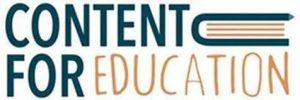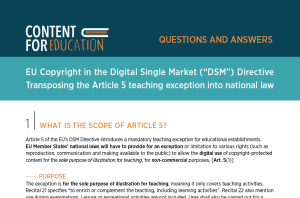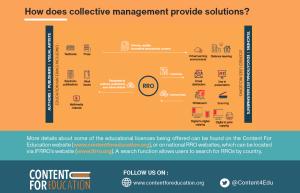EWC joined the Content4Education Campaign,
to support writers and translators during the period of a fair implementing of the DSM Directive. The EU Copyright in the Digital Single Market (“DSM”) Directive 2019/790, adopted in April 2019, includes a mandatory exception to copyright under Article 5 for the “digital use of works and other subject matter for the sole purpose of illustration for teaching”. EU Member States have until 7 June 2021 to transpose the Directive into national law, with some flexibility in how they do so. Read more
CONTENT4EDUCATION: STATEMENTS BY EWC MEMBERS AND EWC PRESIDENT
EWC joined the Content4Education Campaign, to support writers and translators during the period of a fair implementing of the DSM Directive. The EU Copyright in the Digital Single Market (“DSM”) Directive 2019/790, adopted in April 2019, includes a mandatory exception to copyright under Article 5 for the “digital use of works and other subject matter for the sole purpose of illustration for teaching”. EU Member States have until 7 June 2021 to transpose the Directive into national law, with some flexibility in how they do so.
What EWC Members say:
Nina George, Author, EWC President – Germany
.jpg)
Photocredit: Nina George © Julia Baier
Pandemic conspiracy theories in the social networks, extreme political tendencies, fake news factories and government leaders who ignore science and thereby plunge their nations into chaos and misery: we live in a disturbing present in which facts, knowledge, education and well-founded findings have become the most important counterbalance to destructive developments and phenomena of world society. Profound and independently elaborated facts are the backbone of humane civil society.
It is all the more essential to cultivate, promote and protect the sources of these values of knowledge, education, science and teaching: the authors. It is not only climate change that has taught us that sustainability is of paramount importance. This also applies to all dealings with authors’ rights and with copyrighted works and their origins: Nationally stable legal frameworks with a simultaneous forward-looking budget for school and teaching materials and for the authors are a logically imperative investment. It is the vaccination we need to make humane, wise and free decisions.
Article 5(4) of the DSM Directive expressly allows for example the German legislator to provide for remuneration. It is therefore imperative to retain the existing remuneration claim – which is subject to the obligation to pay a Collective Management Organisation – under Articles 60a, 60h (4) UrhG.
This is the only way to preserve substantial knowledge, which is needed more than ever to maintain social immunity against populism and antipluralism.
I refer further to the statement of VG Wort: https://www.vgwort.de/fileadmin/pdf/stellungnahmen/Stellungnahme_Umsetzung_EU-Richtlinien.pdf

Morten Rosenmeier, Professor of copyright law and chairman of the Committee for the Protection of Scientific and Scholarly Work (UBVA) – Denmark

It takes thousands of hours to write a copyright textbook. If the law students are to learn anything it simply has to be of high quality. Much of it is written in my spare time, including weekends and holidays. Copyright and licensing provides an important economic incentive for me, as well as for the publisher who publishes the book. It is not acceptable that EU Member States’ implementation of the new EU copyright law could leave authors in a position where their work is used/copied for free. Why would I spend all that time and effort writing a textbook if everybody can just copy it for free? If I have no remuneration when my textbook is copied, it will no doubt lessen my incentive to spend thousands of hours writing it. If works can be used without limits and remuneration it will no doubt mean that we will get fewer textbooks and the ones we will get will be of a lower quality than the ones we have now.

Carlos Fortea, Author, translator and teacher at the Universidad Complutense de Madrid – Spain

My life revolves around the book, because I am a novellist, because I am a translator, because I am a university professor. This triple condition has made me aware, since a long time ago, both of the fundamental importance of copyright and the need to guarantee the right to information.
For many authors, copyright is not only a form of property, but a source of livelihood: living to write entails living from writing, and that implies that it is necessary to respect creation and remunerate it. This applies to the direct creation by authors, indirect creation by translators, and the scientific creation by professors.
We are dealing with a task with high added value: it requires many years of formation, much trial and error, much effort, constant updating. From it live many other members of the value chain of the book. Even then, we understand it is necessary to enable students and readers to access part of our work, but this must be done with fair conditions. And fair conditions mean licences, rules, the agreed remuneration that allows us to carry on with our work. To respect creation is to respect culture.
If you are interested to learn more visit the official website: www.contentforeducation.orgor download the Content4Education brochure and the FAQ:

ARCHIVE:
July 2018: We are happy to announce that the International Federation of Reproduction Rights Organisations, the European Visual Artists, the European Federation of Journalists, the Federation of European Publishers and the European Writer’s Council are launching the #Content4Education campaign to promote a balanced copyright framework allowing reproductions of works in Education while remunerating creators.
Join: www.contentforeducation.org/sign
Authors, including writers, literary translators, illustrators and journalists, together with teachers and publishers, unite to campaign for the sustainable delivery of quality, innovative, content for education.
The Content for Education campaign (see www.contentforeducation.org) was launched by organisations representing writers and literary translators, visual artists, journalists and publishers, together with the collective management organisations that authorise photocopying and digital reproduction and pass on the fees collected to authors and publishers.
The Content for Education campaign calls on European policymakers to future proof educational practices by not allowing for the unremunerated and unlimited copying of published content. For the sustainability of Europe’s innovative, diverse and local materials for education, it is vital that the “illustration for teaching” exception set out in Article 4 of the Copyright in the Digital Single Market (”DSM”) Directive is balanced:
- Allows Member States to keep their current well-functioning licensing systems
- Provides for remuneration for authors and publishers
- Limits the copying of publications to extracts of works
- Allows Member States to continue excluding text books from the exception
The Content for Education website raises awareness about the potentially negative impact of an unbalanced Article 4 on the creation and the quality of educational materials in Europe. While most EU Member States currently allow for remuneration for copies or uses of works made for educational purposes, the new proposal would mean that any given Member State could legally abolish this in the future. It is therefore important that licensing schemes which allow authors and publishers to be remunerated must be able to prevail and that where the exception applies, the law ensures that there is mandatory fair compensation for rightholders. This will ensure that educators can continue to rely on a rich variety of quality content reflecting different points of view, which is essential to democracy and freedom of expression.
The “illustration for teaching” exception, which could be further jeopardised by some proposed Parliamentary amendments, has far reaching consequences for the future European educational ecosystem, as it opens the door to extensive, unremunerated digital uses that will negatively impact the creation of new educational material. It is only fair that Member States are allowed to promote licensing schemes or in the absence of such schemes, the exception is limited to extracts and compensated for. The testimonials from authors, illustrators, journalists, teachers and publishers, which can be found on the website, illustrate the grave concerns they have about the impact of the proposal on education in the EU.
On behalf of the “Content for Education” campaign, IFRRO CEO Caroline Morgan said:
It is vital that the “illustration for teaching” exception is balanced. The clear message from the testimonials from authors, illustrators, journalists, teachers and publishers on the Content for Education website is that the sustainable delivery of quality, educational content must not be put at risk. There is currently a risk that Article 4 of the Copyright in the Digital Single Market Directive will lead to a lose-lose scenario, not only for authors and publishers, but for teachers, pupils and students across Europe who will be deprived of culturally diverse, innovative, quality content.”
If you are interested to learn more visit the official website: www.contentforeducation.org



